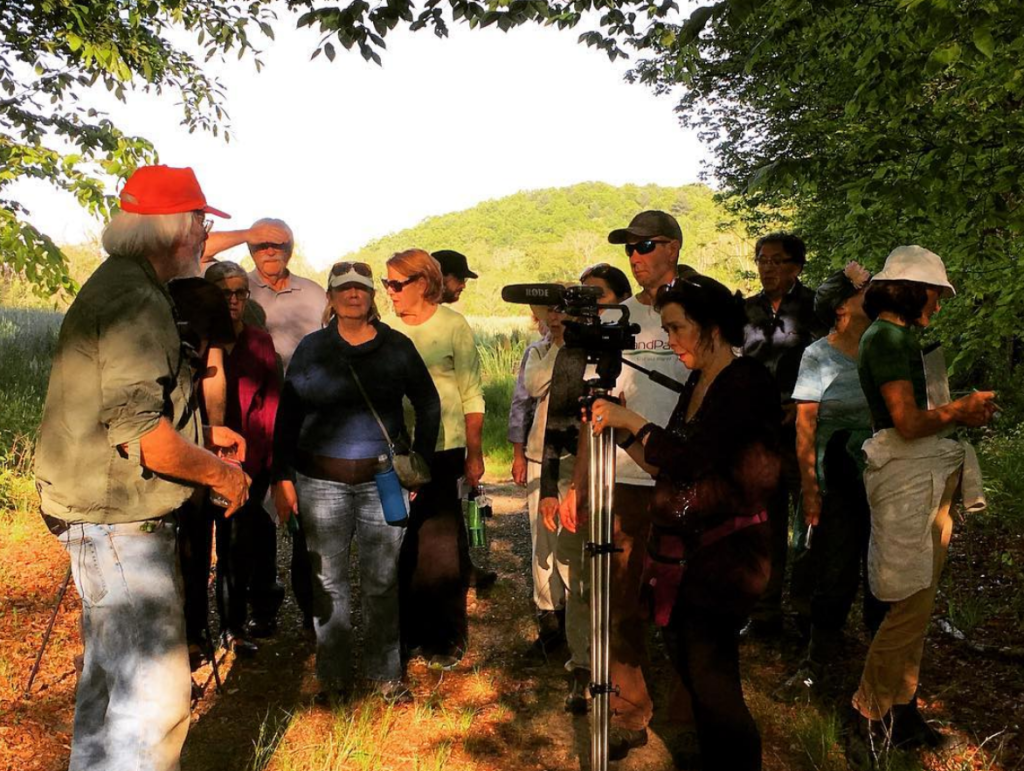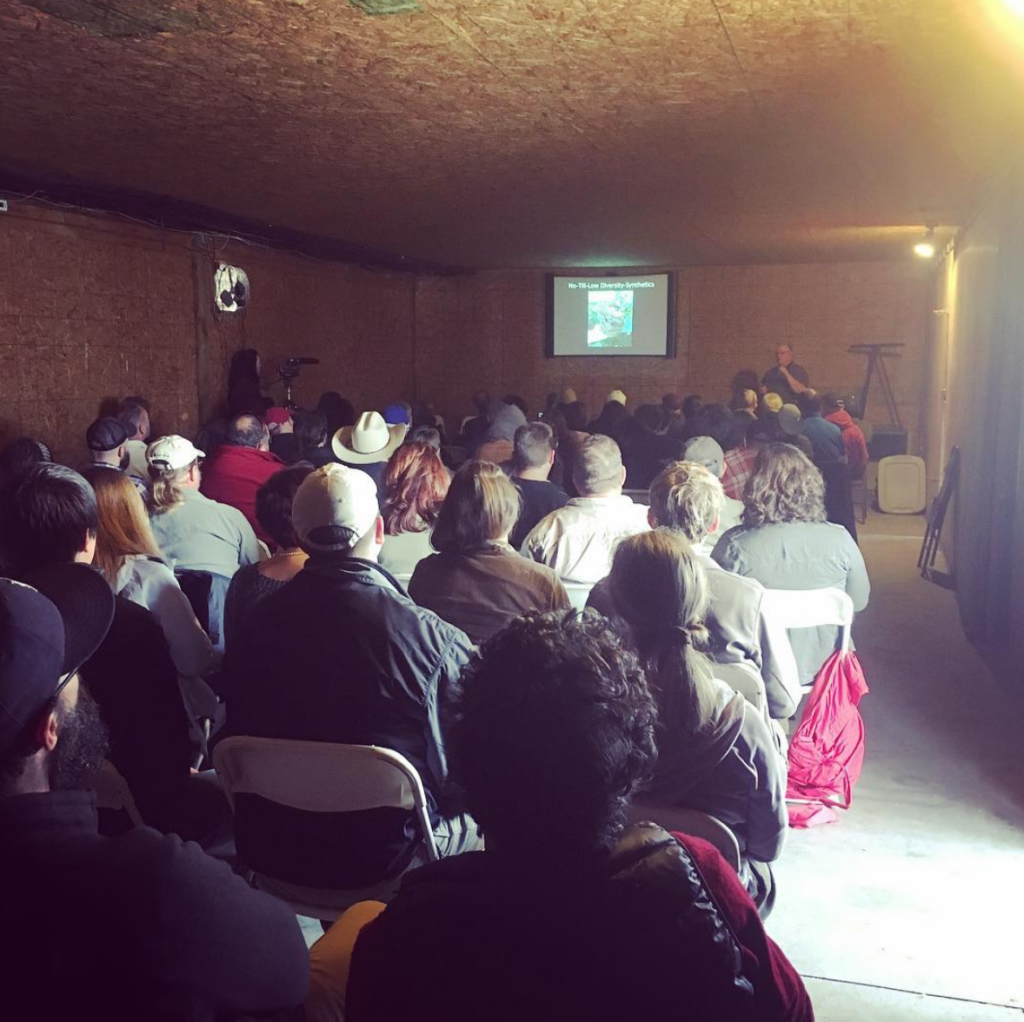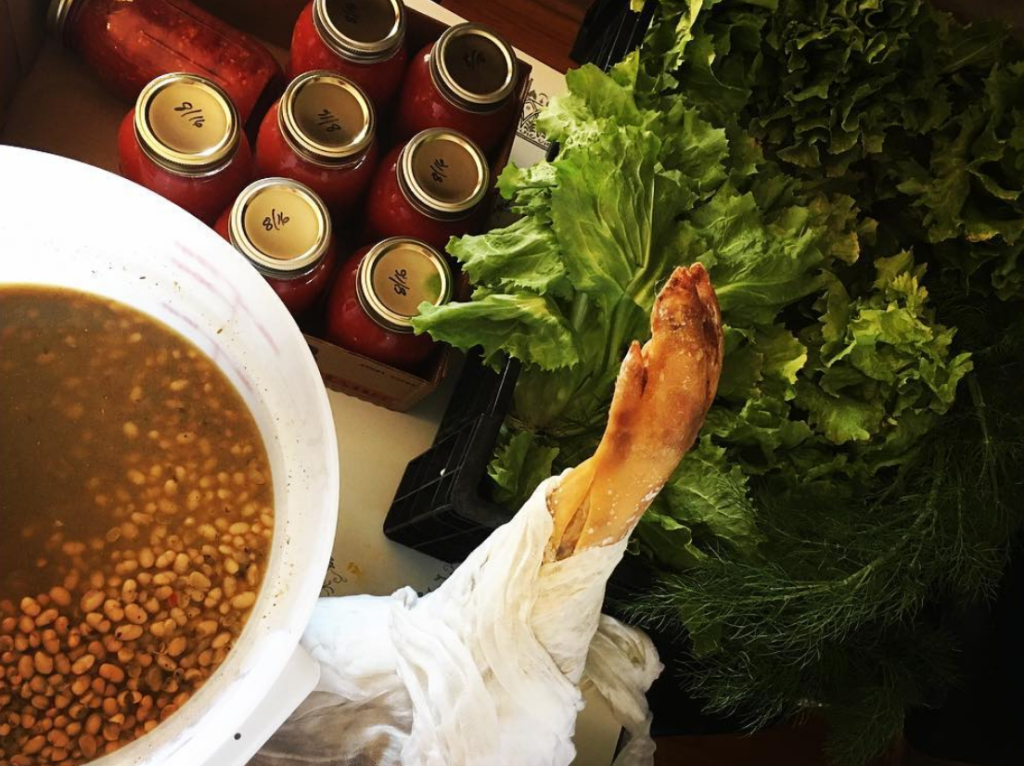by Meredith Leigh, Living Web Farms Education Director & Livestock Co-Manager
At Living Web Farms, we focus on growing food for underserved people, while also building and demonstrating systems for resilient living. Our farm not only produces food, but also seeks to model systems for sustainable food production, alternative energy, animal husbandry, natural medicine and more. Our education program is the way we communicate these efforts, via approximately 24 workshops annually from January to December. The workshops cover a diverse array of topics, from outside expertise, to what we are learning on the ground in our day-to-day work, and developments or curiosities we are working to research. All workshops are filmed, and archived for free on our website and YouTube channel, allowing our education program to reach a worldwide audience.

A workshop on our North Mills River Farm covered spring wild edible plants. You can see our film crew capturing everything while local folks enjoy in-person education.
To accomplish our mission in food production, agriculture research, and education, we employ roughly 15 people throughout the year, some seasonal and some permanent staff. Living Web Farms is primarily funded by donations, and by a board of trustees who must approve expenses and programs. One of the mandates of the board is that workshops not be inaccessible to any person, so we have a sliding scale system in place for workshop registration. This is our best effort to allow people to pay what they feel they can for workshops, with an average “suggested donation” listed for reference. Sometimes folks pay more than the average, if they feel inspired or able, and sometimes people pay less.
When you register for a workshop, you have two options. You can choose to pay the suggested donation, or you can choose a $0.00 ticket price, which is really just an indication that you intend to pay at the door in the amount you can or feel inspired to give.

A screenshot of our web registration process. You can choose to pay the suggested amount online, or choose “Pay at the Door” and bring your donation with you.
What is this money used for? What does a workshop actually cost? What are the implications of a sliding scale honor system for supporting the education program? These are questions we want to consider publicly, to address direct query from our community, and also to set clear intentions about what donations actually mean to the charitable programming at the farm.
What does a workshop actually cost?
The answer to this question obviously varies. We have developed two types of workshops at the farm. We host short-form workshops on weekday evenings. These classes usually last 1-3 hours, and involve some form of demonstration or discussion. The suggested donation for these classes is usually $10, to cover materials for demos and also speakers that we hire from outside of the LWF staff. Long-form workshops are usually held on Saturdays, and include more in-depth information on a subject. Long-form classes also include a light meal made from food grown on the farm. The suggested donation for these events is usually around $15, but can be higher if there are additional costs involved. All workshop donation money is pooled, meaning that donations taken for each workshop are not simply applied to that workshop only, but instead they are used to subsidize the costs of any education that we provide. In this way, some workshops that use LWF staff as teachers and minimal materials can cost us less, but still garner money for us to apply to workshops for which we have outsourced teaching, need to buy any food ingredients we haven’t grown on-farm for the meal, and pay for additional needs. On top of all of this, there is the staff time spent developing the education schedule, promoting the events, interfacing with the speakers, staffing the events, cooking, filming the class, and disseminating the video to the world and fielding questions on YouTube as well as via email. It’s a lot of work!

Our recent workshop with Gabe Brown is an example of an event where we hired a nationally recognized speaker, fed over 100 people, and spent a lot of staff time coordinating and implementing the event. Workshops like this have to be supported by our trustees, but also could not happen without donations from attendees and internet supporters throughout the year.
What is the money used for?
- Speaker stipends
- Workshop materials
- Speaker travel and lodging
- Food items not grown on the farm
What are the implications of a sliding scale honor system for supporting the education program?
We can confidently say that donations gathered from workshops are not ever equal to or greater than the cost to our organization in providing them. This is not our greatest concern, again, as we are chiefly interested in getting information out into the world and making it highly accessible to anyone who wants it. That being said, however, might help community members understand the impact that a donation has on the rest of our shared community, as well as the solvency and longevity of the programming at the farm.
Another implication of our sliding scale system is its impact on our partner organizations. We are fortunate to have generous trustee contributions to make our programming possible. Many of our fellow educational non-profits don’t have this, and must rely on grants and registration fees to fund all the costs of their events as well as their overhead, like staff salaries. We want education to be accessible, but we want to be careful about taking advantage of our blessings, and so want to stress to our community that whatever donation is given is a welcome recognition of the work and cost associated with grassroots, collaborative education of all kinds, and of a coalition of organizations like ours working together to bring you learning and networking.
What are the meals like?
Meals at LWF are meant to showcase the full circle farm experience. You will not only learn about food production or preservation, but you will also get to taste it. That is what its all about! Our staff uses veggies on the farm in peak season, as well as farm goods that we have preserved from previous harvests. Most meals are a vegetarian base, with gluten free and sometimes dairy-free options. We often include a meat option as well, because we believe integrated diets are important for health, and integrated agriculture is important for the planet. Participants are able to indicate on their registration what dietary restrictions might apply to them. We will do our best to accommodate. The meals are always buffet style, offer a chance for participants to share with each other socially, and enjoy innovative, healthful food. All food waste is either composted or fed to the animals after classes. Truly a full circle system!

A shot from behind the scenes in the kitchen. A workshop meal’s components, in this case including preserved tomatoes from a previous season, farm grown beans seasoned and simmered slowly, a leg of our heritage pork that we cured for 2 years in salt, and some fresh endive.
How are Topics Decided?
We publish our workshop schedule every fall for the entirety of the next year. This allows people to plan ahead, or count on education that they need. Topics are decided based on participant and community feedback, as well as staff passion. Very often, we will have been working on an idea or system on the farm that we plan to share with the community later, and these projects will inform future topics on the education schedule. Additionally, we take past workshops and build on them, based on the questions that arose from prior learning, or on developments in the field. If you have topic areas you’d like to see covered that you haven’t seen us cover in videos, send an email to meredith@livingwebfarms.org .
How can I find out more about the education program?
Visit our website’s workshop schedule to see all the classes in this year’s line-up, and to register for any class you wish. You may choose to pay the suggested donation online at the time of registering, or if you choose “Pay at the Door” we will take your cash or check contribution when you arrive.
Where can I watch past videos?
Subscribe to our YouTube Channel, and check out our videos on the website.
Hope to see you out at the farm!